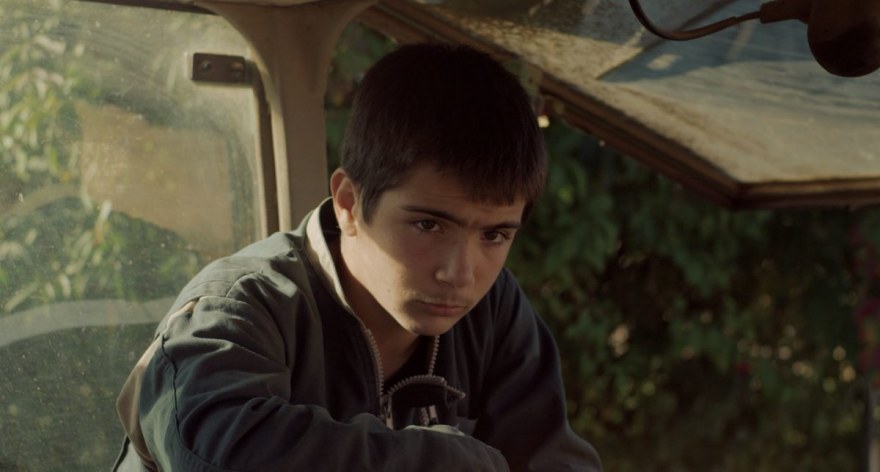Dinner with Le printemps
Interview with Clélia Schaeffer, director of Le printemps [The Spring]
How did you come up with the idea for Le printemps ?
In the beginning, I wanted to talk about solitude in the world of agriculture. From this starting point came the idea of Peter, an introverted teenager who struggles to communicate with others his age. Son of a farmer, he is torn between a reassuring solitude and the resulting isolation. I was interested in showing the small step he makes towards the others, this path that leads him out of his bubble, outside of his protected world.
Why were you interested in the theme of confidence – in oneself, in others?
I think that a lack of self-confidence can feed the fear of communicating, and from this is born a feeling of exclusion. In the film, Pierre demonstrates great courage in going to see Maëva, a girl he is secretly in love with. Even though his attempt doesn’t turn out well, it will help him grow.
Why did you choose this period of adolescence as the crucible for your characters?
Adolescence is fittingly a time of change and transition where one’s self-image is seen through the eyes of others, through a real need of recognition and belonging. Adolescence is also the age of first times, of extreme experiences and of decisive realizations. The discovery of others and the exploration of our own desires are a part of this age. Through the cousin’s character, I wanted to question the teenage rapport with communication, and how relationships are shaped by the easy access and instantaneous exchanges made possible by their digital devices.
Why did you create such a strong contrast between the two cousins, one extremely reserved and the other quite extroverted?
The cousin, who is a few years older, is like an inverted image of Pierre. That said, I don’t think he is necessarily extroverted. He’s a city boy, quite sure of himself and has experience in love. He fascinates Pierre, who trembles where his cousin exhibits disconcerting ease. On one side, the cousin confronts him and through his personality offers solutions to Pierre’s problems. On the other side, through his naive reactions, Pierre dismisses his cousin for his superficial confidence. The two characters are complementary and contrasting at the same time. They have the problems of their age in common, which is where they manage to find common ground.
.
Why were you interested in the fact that the extroverted cousin was not just a passing friend and didn’t live in the village?
I wanted the film to be short so that the cousin’s arrival would have a greater impact on Pierre. This initiatory stay is like a small bomb that upsets his solitary world. Once the cousin has left, Pierre feels ready to return to Maëva, but this time on his own.
Why did you choose the countryside instead of the city as the setting?
We can relate urban solitude to an individual who disappears among the masses. We can feel isolated in the city without there being any apparent act of exclusion. There are different practices in the countryside, such as the way we get around and meet others. I was interested in the contradiction of Pierre being surrounded by people who knew him, and yet he is profoundly alone. As the son of a farmer, I absolutely wanted this teen to be fulfilled in the work he shares with his father. He likes helping him with the farm work and feels at home among the hay and the animals. In a way, an unconscious force emerges from his solitude.
Do you think you might make other films on the theme of first love?
It’s a subject I would like to address, but from another point of view, such as that of a mother who witnesses her son’s first experience with passionate love…
When you wrote Le printemps, did you see it as part of a greater whole, with a “before” and an “after”?
I didn’t write it in thinking of a longer format, but perhaps the other seasons will follow!
Do you think that short film is effective in questioning human relations?
A short film and a feature-length film both offer the same tools when it comes to staging. The length of the short film imposes a more condensed dramaturgy, but it is still possible to tell a story. The language of cinema allows us to spontaneously capture instants of life, emotions and thoughts that emerge sometimes with speed and with force. J.J. Abrams made me cry after 5 minutes with the opening sequence of Star Trek, but then again, I cry very easily…
Le printemps was either produced, co-produced or self-financed with French funds. Did you write the film with this “French” aspect in mind: in building the film’s context or in questioning certain notions?
The universe of this film comes from my own experience and from my love of the Burgundy countryside. From a cultural point of view, it definitely takes place in France. Yet, I think that the heart of the film is universal enough to be transmitted almost as is to Japan or to Mexico, or at least I would hope so!
.
Le printemps is being shown in National Competition F4.








